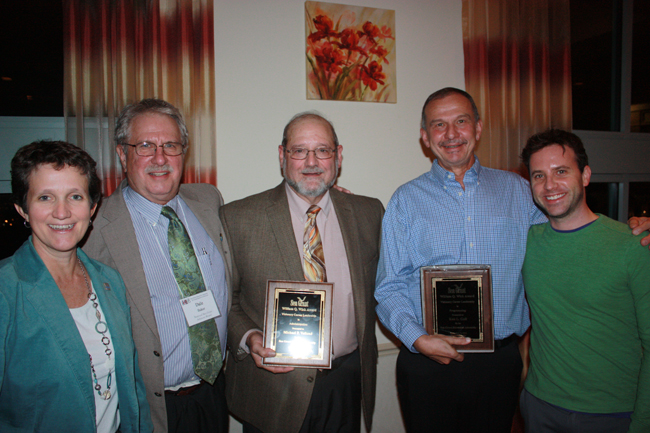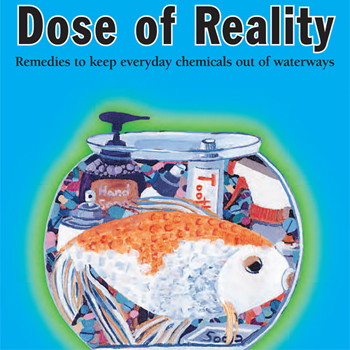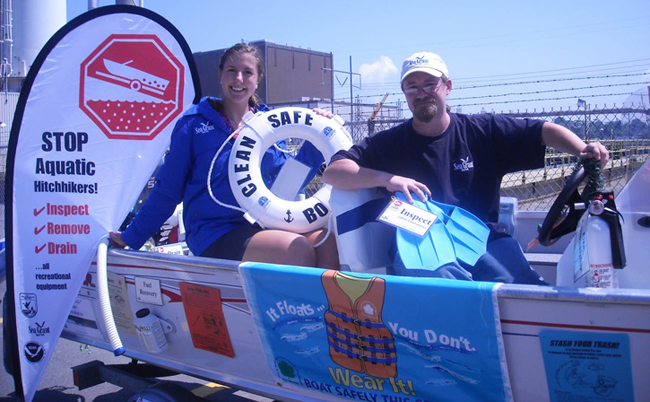New York, NY, December 15, 2013 - In November, the Sea Grant Extension Assembly honored
Ken Gall, longtime Seafood Specialist at New York Sea Grant, for his national leadership in seafood safety, quality and marketing. The Assembly acknowledged Gall's 31-plus years of service to the Sea Grant network with the William Q. Wick Award for Visionary Career Leadership. The award is named for a network leader who served Oregon Sea Grant in multiple roles.
"Ken’s leadership in the area of seafood safety and technology has benefited seafood consumers and those whose livelihood depends on safe seafood not only in New York, but across the country and throughout the world," NYSG Associate Director and Cornell Cooperative Extension Assistant Director
Katherine E. Bunting-Howarth.
Gall’s career focused on supporting seafood—the consumers, industry and food safety research. The reach went from local Long Island to the Fulton Fish Market to the world. His programming trained thousands of seafood processors and agency professionals, nationwide and internationally, to help protect seafood consumers. "He not only communicated research needs to the academic community," said NYSG's Interim Director
William Wise. "but he also orchestrated the formation of New York Seafood Council." This industry non-profit organization disseminates science-based information about seafood through Web sites and newsletters, helping develop marketing messages and strategies.

Long-time Sea Grant staffers Michael P. Voiland and Ken Gall (
pictured above, third and fourth in from left, respectively) were the recipients of the Wick Award for Visionary Career Leadership. They are joined here by NYSG's Bunting-Howarth, former NYSG Associate Director and newly-appointed National Sea Grant Advisory Board member
Dale Baker and NYSG's Web Content Manager
Paul C. Focazio.
Photo: Jurij Homziak, Lake Champlain Sea Grant
With Sea Grant peers, he co-led and co-created
www.seafoodhealthfacts.org, a Web site devoted to assisting the public in understanding seemingly conflicting information about seafood consumption. In 2012, The Mid-Atlantic Sea Grant Extension Network recognized Gall and Delaware Sea Grant’s Doris Hicks for this effort.
Over 8,100 individuals from seafood companies and regulatory agencies have participated in live and Internet-based training to comply with the Food and Drug Administration’s seafood Hazard Analysis Critical Control Point (HACCP) regulation for food safety, all led or managed by Ken Gall. The requirements impacted thousands of processors nationally—with over 600 in NY contributing over $1 billion in economic benefit. Recently, Ken took the work internationally with trips to Japan and China. These trainings and Ken’s involvement in associated research saved countless lives and prevented sickness.
In addition to being recognized by the Sea Grant Extension Assembly as well as twice by the Mid-Atlantic Sea Grant Extension Network, Gall’s numerous awards include: Earl P. McFee Award for outstanding contribution to the field of Seafood Science and Technology; William Hickey Award for Outstanding Service in the Field of Food Sanitation from NYS Association of Milk and Food Sanitarians; and Outstanding Outreach Program Award, Northeast Sea Grant Network. He published in peer-reviewed journals.
"Ken’s vision augmented his talents at collaboration and relationship-building," said Wise, adding the following examples to further illustrate his point:
- Ken saw the need for New York seafood industries to ban together and create marketing strategies to promote their products.
- He understood that DNA fingerprinting methods could be used for the long-term benefit of the industry which led to important research.
- Ken’s vision, in 1996, had already led the ready-to-eat seafood industry to take pro-active steps in preventing these types of incidents.
- Ken also worked on a project to develop specific detection methods for Vibrio parahaemolyticus O3:K6, a foodborne pathogen of particular concern to New York’s shellfish industry. It was through Ken’s existing contacts with researchers, NYSDEC and various FDA research laboratories that an interdisciplinary team formed to address this problem.
- In addition, he embraced technology for delivering research including Internet-based training courses and a website devoted to educating the public about seafood safety.
Along with Gall, the Sea Grant Extension Assembly also gave a top award this fall to
Michael P. Voiland for his 40-plus years of service. Voiland, who retired as North Carolina Sea Grant executive director in December 2012, had a career with New York Sea Grant and Cornell University prior to joining North Carolina Sea Grant in 2006.
Dose of Reality Campaign Doubles Up

Through the "Dose of Reality Campaign," Sea Grant programs in five Great Lakes states have worked with law enforcement agencies to reduce the quantity of prescription medications that are washed down sinks and toilets, thereby reducing the risk of biologically active compounds in drugs contaminating lakes, rivers and drinking water sources. The efforts of specialists throughout these five Great Lakes Sea Grant programs - in Pennsylvania, Illinois, Indiana, New York and Ohio - have been recognized as a Top 100 Great Lakes Restoration Initiative Success Story.
This is the second award that New York Sea Grant's coastal education specialist
Helen Domske has received for this campaign in as many years. In October 2012, Great Lakes Sea Grant Extension Network bestowed upon Domske an Outstanding Outreach Award for public education programming related to “Dose of Reality."
A survey by Domske’s Great Lakes Ecology students at the University of Buffalo indicated that a majority of their family and friends lacked awareness about proper disposal techniques. With that, Domske authored “
Undo the Environmental Chemical Brew: Keep Unwanted Medications & Chemicals Out of the Great Lakes” (
pdf), a publication co-produced by New York, Illinois-Indiana, Ohio and Pennsylvania Sea Grant programs with funding through the Environmental Protection Agency's Great Lakes Restoration Initiative.
Domske’s 4-page primer - which highlights points made in a 12-page
Dose of Reality publication (
pdf) - covers the impact of such substances as antibiotics, antidepressants, birth control pills, cosmetics, and even vitamins on the freshwater Great Lakes system that supplies drinking water to 42 million people in the U.S. and Canada.
Since inception of this campaign several years ago, more than 2 million pills were collected at drug drop-off events in the five states. On one day in October 2011, officials in Lorain County, Ohio, collected 1,300 pounds of pharmaceutical and personal care products. The Sea Grant programs also distributed information about improper disposal of PPCPs to more than 700,000 residents in the Great Lakes region.
Aquatic Invasives Education Also Applauded

The Great Lakes Restoration Initiative also named "Stop Aquatic Hitchhikers!" as a Top 100 Success Story. Domske, in addition to NYSG's Recreation and Tourism Specialist Dave White and Coastal Community Development Specialist Mary Penney, continue to work on this project with others in the Great Lakes Sea Grant network. White educates boaters throughout the year via his "
Clean and Safe Boating Campaign" and Penney with her
Launch Stewards Program, who, through a variety of platforms, better inform recreational users how they, too, can help stop the spread of aquatic invasive species. Domske educates about aquatic invasive species through a variety of ways as well, such as on teacher trainings like this past summer's "
Shipboard and Shoreline Science Workshop."
The first phase of the "Stop Aquatic Hitchhikers!" campaign, which received a $1.5 million Great Lakes Restoration Initiative grant in 2010, was seen by 10 million people across the Great Lakes basin.The latest GLRI grant of $400,000 is expected to help the campaign reach another 7 million people.
“These well-deserved awards recognize the excellence of the programming developed by New York Sea Grant Extension educators throughout New York State," said NYSG's Bunting-Howarth. "The public reaps the benefits of their work to educate communities about what we can all do to help maintain the vitality and environmental quality of New York’s Great Lakes and marine coastal ecosystems."
More Info:
New York Sea Grant (NYSG), a cooperative program of Cornell University
and the State University of New York, is one of 33 university-based
programs under the National Sea Grant College Program (NSGCP) of the
National Oceanic and Atmospheric Administration (NOAA). The NSGCP
engages this network of the nation’s top universities in conducting
scientific research, education, training and extension projects designed
to foster science-based decisions about the use and conservation of our
aquatic resources. Through its statewide network of integrated
services, NYSG has been promoting coastal vitality, environmental
sustainability, and citizen awareness about the State’s marine and Great
Lakes resources since 1971.
For updates on Sea Grant activities:
www.nyseagrant.org has RSS,
Facebook,
Twitter, and
YouTube links. NYSG also offers a free e-list sign up via
www.nyseagrant.org/coastlines for NY Coastlines, its flagship publication, and Currents, its e-newsletter supplement, each distributed several times a year.